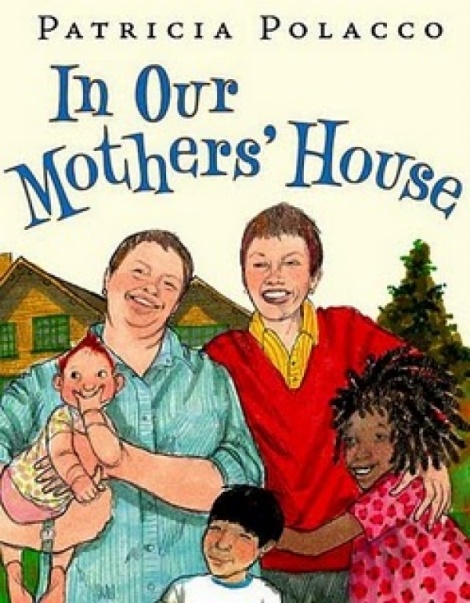Last Spring, a school district in Davis County, Utah removed In Our Mothers’ House by Patricia Polacco from the shelves of its libraries after 25 parents signed a petition for its removal. The book? This book:

This book is about two moms raising a family and the hatred they experience from their neighbors because of that. It’s about love and laughter. It’s written for grades 1 through 4. The book was added to the libraries’ collections when school administrators found out that a student was being raised by lesbians, all in an effort to foster inclusion. In a stunning and embarrassing display of irony whizzing right above their heads, the Davis County school district acquiesced to the handful of bigoted parents by making the book available only to students who had signed permission slips from their parents or guardians. They moved the book behind the librarians’ desks. Students did not know about the book. They did not know they could access it. The rationale? Davis County District spokesperson Chris Williams said that state law instructs that schools “can’t have anything in the curriculum that advocates homosexuality.” Furthermore, they restricted the book so that only 3rd grade and above would be able to check it out at all.
Parent Tina Weber objected to the restriction so much that yesterday the ACLU filed a lawsuit on her behalf. The Davis County School district is getting sued over restricting the children’s rights to free speech and placing “a discriminatory burden on the students’ ability to access fully protected speech.”

When I first read this headline, I thought someone was going to be suing the school district over including the book, because that’s usually how fucked up people are. But then the letters ACLU jumped off the page and I read further. And I thought, well, this is actually what our justice system is supposed to be used for. This isn’t a frivolous lawsuit. Weber elaborated in a statement issued through Utah’s ACLU office, “I was shocked when I heard that a handful of parents had made a decision about whether everyone else’s kids could have access to this book.” The legal system is supposed to protect our rights and in this case it is protecting access to free speech, our access to books.
Yet so many parts of this situation and how it came to pass at all signify all different areas of American society and culture that are totally and completely fucked.
In an article by Peg McEntee from the Salt Lake City Tribune, this quote struck me as particularly relevant:
The bookseller nailed it.
“They’ll let their 10-year-olds read The Hunger Games,” she said Saturday. “But not this.”
This being In Our Mothers’ House, a beautifully written and illustrated story about a big brown house on Woolsey Street where Meema and Marmee raise their three children.
Meema and Marmee are women; their children were adopted. Meema’s Italian grandparents are frequent visitors and the family lives in an integrated neighborhood where communal treehouses are built and street fairs organized.
Our society does not care one wit about violence. According to the documentary This Film is Not Yet Rated, other countries rate their movies more harshly based on violent material, whereas the U.S. will hike up a rating based on sex, sexuality and, even more specifically, homosexuality. The same attitude, it seems, would apply to books. It certainly has in my experience. Depictions of love warrant a crack down, but parents will hand over the ultra-violent Hunger Games to their children as if they were dolling out Halloween candy.
Then of course, there is the obvious. Not only is it limiting of free speech, but the lawsuit states “Even worse, restricting access to ‘In Our Mothers’ House’ and segregating it from the rest of the library collection places an unconstitutional stigma on the book and the students who wish to read it.” It stigmatizes gay families in that one needs special permission to read about them. In what universe is two moms inappropriate? It also defacto restricts access to the book because, let’s face it, would you have read a book so stigmatized for being non-normative if everyone had to watch you go up to the librarian carrying a permission slip from your mommy in order to get it? No, of course you wouldn’t, because kids don’t want to be different. They want to be included. Like In Our Mothers’ House teaches us.
Yet another issue with this is the dumbing down of children’s curiosity and education. That book is appropriate for grades 1-4. Yet the school is telling children that first and second graders won’t be able to process this information. They also do not advertise to children that the book is available to read:
Still Williams acknowledges that school libraries have no signage or any indication for students that Our Mothers’ House is not on shelves but behind the librarian’s counter. When asked how students who knew nothing of the book would know it existed but wasn’t on the shelves, Williams says:
“I bet if you are a student you don’t know about 99 percent of the books on the shelves anyways.”
PUKE PUKE PUKE PUKE PUKE. We should expect our children to be curious. We should encourage them to read books. We should not settle for this attitude about elementary education. Children are brilliant! I used to teach second grade French, and really, elementary schoolers are capable of a lot (like making sentences in French after only two weeks of practice, I shit you not.) Telling them that they can’t or shouldn’t be interested in expanding their minds, their points of view, is sickening. Children should have access to reading material because we are not a nation that decides what you read. The material is age appropriate. Deal with it.

Even after all of this, the school district feels good about the decision they made and is standing behind it, which baffles me. “We still feel comfortable with the process we followed,” says Williams. “That process is laid out in school district policy and that policy existed for years before this issue came to a head.” Never mind that it’s the only book that’s ever had this policy applied to it. Never mind that the policy is unconstitutional. Never mind that the book is not advocating for homosexuality, but rather advocating for diversity and families. Never mind any of that. The district is down with it. They’ve also said, despite the lack of signage and the stigma associated with it, that they believe having it behind the desk still qualifies as access. “The parent is still in the driver’s seat,” Williams says regarding the ability to obtain the book.
In short, Weber is right to sue the district. School is where kids should go to learn about other people’s values and how to coexist with everyone, as they will have to do in their communities as they grow up and as they enter their world as citizens. Home is where children should go to learn about their families’ values. Decisions about access to age appropriate reading material should not be left to 25 parents out of an entire school district. This book was purchased for a reason. I’m glad Weber is suing. I would too.








Comments
This all kinda of makes sense. We need ass-kicking soldiers to defend our nation. Sexually transmitted diseases only hinder our ability to defend ourselves. Hence it makes sense to inure our children to violence while at the same time discourage immoral behavior.
Violence being moral behaviour? Jack, I can ‘kinda of’ tell we’re going to be friends forever.
As John Oliver said, in wake of the Dave Petraeus scandal, we need to do something about heterosexuals in the military.
AHAHAHAHAHAHHAHAAAHAHAHAHAHAHA. LOL.
Wait, you’re serious, aren’t you? Just a sec, I’ll laugh harder. AHAHAHAHAHAHAHAHAHAHAHAHAHAHAAHAHAHAHAHAHAHAHAHAHAHAHAHAHAHAHAHAHAHAAHAHAHAHAHAHAHAHAHAHAHAHAHAHAHAHAHAHAHAAHAHAHAHAHAHAHAHAHAHAHAHAHAHAHAHAHAHAHAAHAHAHAHAHAHAHAHAHAHAHAHAHAHAHAHAHAHAHAAHAHAHAHAHA.
No, seriously, you’re awful.
I put myself through grad school being a nanny. I remember seeing this book displayed in the local library’s children’s room and having very fuzzy feelings about that community. It is a beautiful book and this is a great article. Thanks for bringing it to our collective attention!
“I bet if you are a student you don’t know about 99 percent of the books on the shelves anyways.”
Now that’s what I call an affront to education.
The fight comes to Utah. Taking back America…in all fifty states.
“I bet if you are a student you don’t know about 99 percent of the books on the shelves anyways.”
Well, yes, generally one would not have to know about them beforehand because one would look at the shelf and then know about them. That’s where people go to discover books.
Uggggh. WTF is wrong with people?! This makes me want to hurl something. So much stupidity.
As a gay lady born and raised in Utah I hate both that this is happening and that because of it people associate such bigotry with my state. Unfortunately the cities where this book ban has occurred are not as accepting. I am fortunate enough to live, work, and go to school in Salt Lake City which as a whole is accepting of all people regardless of sexual orientation and has enacted city ordinances to reflect this. I am also aware of the strong religious and conservative background that encompasses the majority of the state which is not as accepting. But, even in a state dominated by a single religion that in the past has actively campaigned against my equality I hold out hope in humanity and work to educate all people on equality because I do believe that lawsuits like this one and ongoing grassroots efforts will eventually prevail and I will be able to live openly and marry the woman that I love legally regardless of the state I reside in.
I think marriage equality will come to Utah sooner than to the south.
“I bet if you are a student you don’t know about 99 percent of the books on the shelves anyways.”
This just infuriates me so much. I remember actually running out of books to read at my grade level when I was in elementary school. I don’t know if that was just me loving reading or if all young children really like books (I hope the latter), but this dismissive statement really shows how much that school district cares about its students’ education aka none.
The violence vs. sex stigma is something that has always puzzled me (especially when it’s something that isn’t really about sex, like this, but that’s a whole different issue). Generally, the kids who people think are young enough to be “ruined” by sex scenes are also too young to understand what’s going on. That’s why shows like Animaniacs or Rocko’s Modern Life get away with making veiled (or sometimes not so veiled, as with this clip) sex jokes without being kicked off the air. On the other hand, kids get from an early age what violence is, and are thus easily traumatized by it from that age. So where on earth did American culture get the idea that sex is worse?
I’ve always thought this way. When I rewatch movies that I first saw and loved as a kid, I’m constantly picking up on sexual content that I was happily oblivious too the first few times around.
I think it’s also interesting to note that “Utah is barely passing when it comes to education, earning an overall grade of C-, according to Education Week’s annual Quality Counts report.” –
http://www.sltrib.com/sltrib/news/53279780-78/education-utah-percent-report.html.csp
Might have something to do with their aversion to booklearnins such as this.
I’m an awful person for saying this but, god, why do they have to look like that? :(
Because not everyone is born traditionally beautiful on the outside. It is so important to teach ourselves to look for the positive qualities a person has rather than how “pretty” they are. If you truly feel awful for saying that, maybe you need to spend some time thinking about the consequences for judging people based on appearance alone. Perhaps finding a copy of the book and reading it through might be a good start.